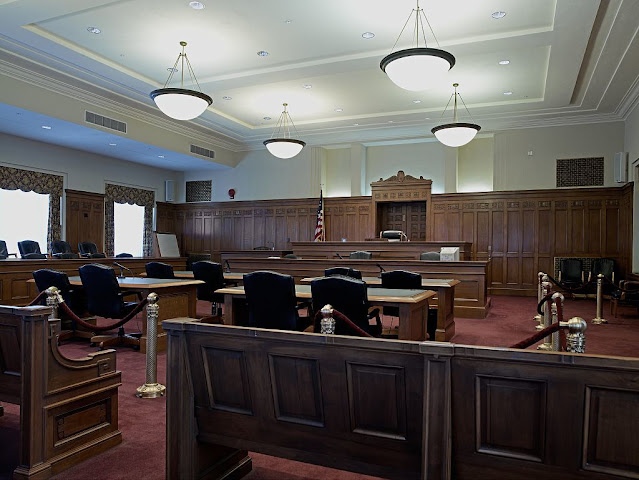Legal records of all kinds are often listed as genealogically valuable but without a significant effort to learn the language used by legal practitioners, such as lawyers, judges, and court personnel: genealogists find it difficult to use these valuable legal resources.
One of the comments made about attending law school in the United States is that you go to school for three years to learn how to make a noise like a lawyer. Part of this statement is generally true. One of my early experiences after being admitted to law school revolved around the fact that I started to work as a reference librarian in the law school library three months before classes started. During the first few days as the semester began, I worked at the reference desk and had a clear view of the stack of reference books that included the law dictionaries. As each hour's class ended, there was a stampede of students into the library to grab the dictionaries to try and understand what the law professors had just said in class. I had a good laugh. I grew up in a home where my father was an attorney and I ended up in a Boy Scout sponsored legal Explorer Post. With additional trips to court with my father, I thought I knew more than most of the students.
The idea that I knew something more than anyone around me soon evaporated in the overload of unfamiliar legal terms. I learned to live with one important book: Black's Law Dictionary. Here is a link to an online version of that extremely valuable book.
 |
| https://thelawdictionary.org/ |
Reading a legal document, at first, is exactly like trying to read something in a language you do not speak such a German to an English speaker. Learning all the vocabulary can be overwhelming. But in addition to the vocabulary itself, there are concepts that are utterly foreign to those who do not speak the language. Now we fast forward almost 40 years and guess what? I still have a copy of Black's Law Dictionary sitting on my desk or behind my desk within arm's reach.
Now, what about the genealogist who has no legal training? What can they do to acquire the language and the concepts that allow them to understand historical legal documents that may also be handwritten and even more difficult to decipher? They can do what those first-year law students did. Run, not walk, to the law dictionaries and start learning this, to them, foreign language.
Today, besides the specific legal language websites, we have Google. I can now take a legal term such as "assumpsit" and type "define assumpsit" and almost instantly get an answer, which is, by the way, as follows:
Assumpsit, or more fully, action in assumpsit, was a form of action at common law used to enforce what are now called obligations arising in tort and contract; and in some common law jurisdictions, unjust enrichment.
Of course, this definition will lead you to define some of the other terms also, such as "common law, tort, contract, and unjust enrichment." Do you have to become an attorney to understand the language? Only if you want to represent people in court. Genealogists need to learn the terms used in historical, genealogically valuable documents which include legal documents. If you do not understand what is written in a will, for example, don't guess at what it says. Either take the time to learn or ask for help from someone who can help.
Genealogy is not simple. It is not easy. It is not something everyone can do in five minutes. Keep learning and don't give up. It is worth the effort.
Remember the BYU Virtual Help Desk is available to help. See https://fh.lib.byu.edu/live-virtual-missionary-help/





No comments:
Post a Comment